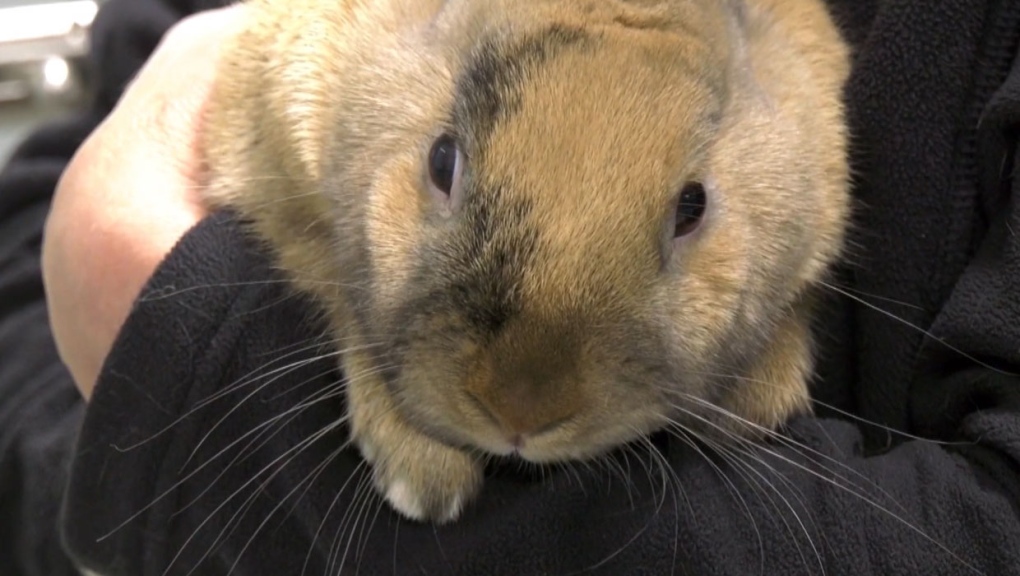No rabbit hemorrhagic disease identified in Banff National Park so far, Parks Canada says
 Rabbit hemorrhagic disease is a highly contagious, fatal illness that affects only wild and domestic rabbit populations. (File)
Rabbit hemorrhagic disease is a highly contagious, fatal illness that affects only wild and domestic rabbit populations. (File)
Wildlife experts say there have been no confirmed cases of a fatal virus that affects rabbit populations in Banff National Park, but that doesn't mean they aren't concerned.
Parks Canada confirmed to CTV News on Monday that it is monitoring the native populations of rabbits (lagomorphs) within the region, but has not discovered any cases of rabbit hemorrhagic disease (RHD) in any of them.
Concerns were raised in mid-December when the Town of Canmore announced it had identified a case of RHD in the community.
"It is highly likely that the disease is spreading through Canmore's feral rabbit population," the town said in a statement on its website.
The illness is highly contagious and fatal among both wild and domestic populations of rabbits, but does not affect humans, officials said.
Other animals are also safe from the virus, but those with pet rabbits should take precautions.
"RHD poses risks to pet rabbits, but not to any other household pets like cats, dogs, birds, etc.," the town said. "If you own a pet rabbit, be sure that you keep your pet indoors and away from shoes, articles of clothing or equipment that may have come into contact with an outbreak area."
Parks Canada says RHD is a concern for all native populations of rabbits in Banff, including snowshoe hares and pikas.
"All sightings of animals in distress or deceased animals should be reported to Parks Canada dispatch: 403-762-1470. Those that discover a dead lagomorph (or any dead wildlife) are asked to refrain from touching the animal and to call dispatch as soon as possible," Parks Canada said.

Authorities in Canmore say anyone who encounters a dead rabbit on their property should put on personal protective equipment such as gloves and clean it up to minimize contamination.
"(It should be) placed inside two plastic bags and disposed of in a bear-proof garbage bin," the town said.
Residents can also contact Canmore's municipal enforcement team for help.
CTVNews.ca Top Stories

'I just can't believe that it took so long': Body found in wreckage 3 months after deadly fire
A man accused of arson in a January Old Strathcona apartment fire is expected to be charged with manslaughter after a body was discovered in the burned building late last month.
No proof man lied to brother about number of kittens born in litter, B.C. tribunal rules
A man was denied a $5,000 payout from his brother after a B.C. tribunal dismissed his claim disputing how many kittens were born in a litter.
Quebec police hand out hundreds of tickets to Hells Angels and other bikers before 'first run' meeting
Quebec provincial police handed out hundreds of fines to Hells Angels members and other supporting motorcycle clubs who met for their 'first run' in a small town near Sherbrooke, Que.
Grandparents killed in wrong-way crash on Hwy. 401 identified
A 60-year-old man and a 55-year-old woman killed in a wrong-way crash on Highway 401 earlier this week have been identified by the Consulate General of India in Toronto.
Auston Matthews skates ahead of Game 7, status unclear with season on the line
Centre Auston Matthews of the Toronto Maple Leafs hasn't been ruled out of tonight's Game 7 against the Boston Bruins.
Snakes almost on a plane: U.S. TSA discovers a bag with small snakes in passenger's pants
According to an X post by the Transportation Security Administration, officers at the Miami International Airport found the small bag of snakes hidden in a passenger's trousers on April 26 at a checkpoint.
A Chinese driver is praised for helping reduce casualties in a highway collapse that killed 48
A Chinese truck driver was praised in local media Saturday for parking his vehicle across a highway and preventing more cars from tumbling down a slope after a section of the road in the country's mountainous south collapsed and killed at least 48 people.
Russia puts Ukrainian President Zelenskyy on its wanted list
Russia has put Ukrainian President Volodymyr Zelenskyy on its wanted list, Russian state media reported Saturday, citing the interior ministry’s database.
Britney Spears 'home and safe' after paramedics responded to an incident at the Chateau Marmont, source tells CNN
A source close to singer Britney Spears tells CNN that the pop star is 'home and safe' after she had a 'major fight' with her boyfriend on Wednesday night at the Chateau Marmont in West Hollywood.
































